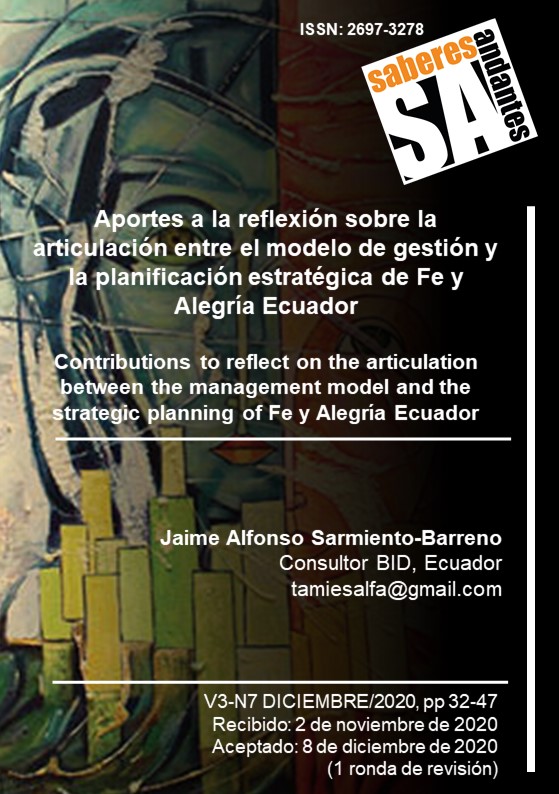Contributions to reflect on the articulation between the management model and the strategic planning of Fe y Alegría Ecuador
DOI:
https://doi.org/10.53387/sa.v3i7.63Keywords:
management model, indicators, strategic planning, organizational management, development managementAbstract
This article for discussion begins with a reflection about the management model of the Asociación Fe y Alegría Ecuador (hereinafter Fe y Alegría) and the reasons for collectively visualizing the need to identify those elements that allow to measure the results or evidence of the social transformation proposed by the institutional mission of Fe y Alegría. Fe y Alegría Model of Organizational Management by Processes bases, defines, characterizes, and represents the components of its organizational system and the interrelationship that should be generated among the components of the organization in order to facilitate the fulfillment of the mission of social transformation of this educational institution. The document contains the model of organizational management, the value chain, organizational structure, hierarchical levels, and descriptive organizational structure of the national office and the decentralized governing processes. The value chain of this organization differs from a business model, since its systemic functioning aims to achieve social effects of public value, while in a private organization the concept of value is associated with the benefit or profit that the private initiative seeks to generate. In this sense, the value chain for this nonprofit social organization can be articulated with the concept of development results framework. Based on the analysis of the elements of the organizational management model of Fe y Alegría Ecuador and the concepts of public value creation, development results framework and indicators for monitoring development initiatives, the following proposal seeks to contribute to the planning and knowledge management of this institution, with a series of recommendations and criteria to address the challenge of generating evidence of the progress, results and social impact pursued through education and social promotion.
Downloads
References
Asociación Fe y Alegría Ecuador. (2016). Estatuto Orgánico de Gestión Organizacional por Procesos. Quito: Fe y Alegría.
Asociación Fe y Alegría Ecuador. (2016). Planificación Estratégica 2015-2019. Quito: Fe y Alegría Ecuador.
Fe y Alegría Ecuador. (22 de Agosto de 2016). Estatuto Orgánico de Gestión Organizacional por Procesos de la Asociación Fe y Alegría Ecuador. Quito, Pichincha, Ecuador: Asociación Fe y Alegría Ecuador.
Fe y Alegría Ecuador. (Diciembre de 2020). Plan Estratégico de Fe y Alegría 2021-2025. Quito, Ecuador.
INDES. (Febrero de 2016). El Desarrollo y su Gerencia. Programa Efectividad en el Desarrollo. Washington, Estados Unidos: Instituto Inter-Americano para el Desarrollo Económico y Social - Banco Interamericano de Desarrollo.
INDES. (Abril de 2016). Marco de Resultados para el Desarrollo. Programa Efectividad en el Desarrollo. Washington, Estados Unidos: Instituto Inter-Americano para el Desarrollo Económico y Social - Banco Interamericano de Desarrollo.
Metcalfe, L., & Richards, S. (1993). Improving Public Management. Londres: SAGE, Second Edition.
Ministerio de Educación. (Marzo de 2015). Ministerio de Educación. Obtenido de Estadística Educativa Reporte de Indicadores: https://educacion.gob.ec/wp-content/uploads/downloads/2017/06/PUB_EstadisticaEducativaVol1_mar2015.pdf
Naranjo, S., González, D., & Rodríguez, J. (2016). El reto de la gestión del conocimiento en las instituciones de educación superior colombianas. Revista de la Facultad de Humanidades Universidad Pedagógica Nacional, 151-164.
Quintero, J., & Sánchez, J. (2006). La cadena de valor: Una herramienta del pensamiento estratégico. TELOS. Revista de Estudios Interdisciplinarios en Ciencias Sociales. Universidad Rafael Belloso Chacín, 377-389.
Sallis, E., & Jones, G. (2002). Knowledge Management in Education: Enhancing Learning & Education. Londres: Kogan Page Limited.

Downloads
- PDF :: Aportes a la reflexión sobre la articulación entre el modelo de gestión y la planificación estratégica de Fe y Alegría Ecuador.pdf (Español (España))
- EPUB :: Aportes a la reflexión sobre la articulación entre el modelo de gestión y la planificación estratégica de Fe y Alegría Ecuador.epub (Español (España))
Published
How to Cite
Issue
Section
License
Copyright (c) 2020 Jaime Alfonso Sarmiento-Barreno

This work is licensed under a Creative Commons Attribution-NonCommercial-ShareAlike 4.0 International License.
1. Derechos de autor
Las obras que se publican en Saberes Andantes están sujetas a los siguientes términos:
1.1. Saberes Andantes, conserva los derechos patrimoniales (copyright) de las obras publicadas, favorece y permite la reutilización de las mismas bajo la licencia Licencia Creative Commons 4.0 de Reconocimiento-NoComercial-CompartirIgual 4.0, por lo cual se pueden copiar, usar, difundir, transmitir y exponer públicamente, siempre que:
1.1.a. Se cite la autoría y fuente original de su publicación (revista, editorial, URL).
1.1.b. No se usen para fines comerciales u onerosos.
1.1.c. Se mencione la existencia y especificaciones de esta licencia de uso.








